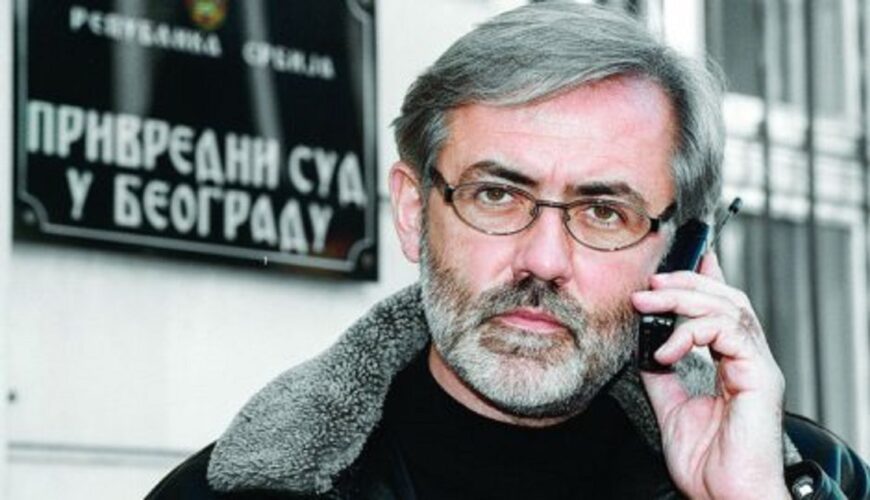To mark the twenty-fourth anniversary of the murder of Serbian editor and publisher Slavko Ćuruvija, the International Press Institute (IPI) today joins press freedom organisations in visiting Belgrade to renew our calls for justice and issue fresh warnings about the current climate for the safety of journalists.
The mission to Belgrade comes 24 years after Ćuruvija was shot dead in cold blood outside his apartment on 11 April 1999, and a matter of weeks after the final hearings began in the retrial of four state security officials accused of planning and executing his assassination. With justice almost within reach, this year’s anniversary offers a timely opportunity to consider the past, the present and the future.
First and foremost, our organisations today pay our respects to the work and life of Slavko Ćuruvija, who was killed for upholding the highest of journalistic values: the unwavering quest to hold power to account through fiercely independent reporting. Despite repeated attempts by the Milošević regime to shut down his newspapers, the journalist refused to be cowed into silence and paid the ultimate price for his bravery.
Secondly, we will stand in solidarity with his loved ones, former colleagues, and all those who continue the more than two-decade fight to ensure those responsible for this crime cannot act with impunity. This includes journalist and media associations, the Commission to Investigate the Murder of Journalists and the Slavko Ćuruvija Foundation – whose tireless efforts have been so crucial for the slow push towards accountability.
Thirdly, we will renew our hopes for the upcoming ruling, which will either confirm or dismiss the two previous guilty verdicts. The Court of Appeal’s ruling will be the most consequential for media freedom and journalism in Serbia’s modern history, and will act as a litmus test for the rule of law and democracy more widely.
Fourthly, we will meet editors, civil society groups and the government’s Working Group to review the current situation regarding the safety of journalists in Serbia. Our visit comes amidst a spate of recent death threats and pressure, which reflect a wider toxic climate for independent and investigative journalism. It is alarming that leading journalists are still receiving death threats and being branded with the same dangerous labels of “traitors” and “foreign mercenaries” that were used to lay the groundwork for Ćuruvija’s assassination.
This hostility against the press has been emboldened by the behavior of high-level political figures, who continue to demonstrate little will to condemn attacks against journalists and in many cases initiate verbal attacks themselves. In addition, Serbia provides one of the most fertile grounds in Europe for abusive lawsuits against public watchdogs. A handful of public officials routinely sue journalists over their critical reporting – including filing multiple cases for the same publication.
While some progress in punishing crimes against journalists has been achieved in recent months and the authorities appear to prosecute new attacks on journalists with greater efficiency, Serbia remains one of the most dangerous places to work as a journalist in Europe. Looking ahead, we will renew our calls to the current government and state authorities to uphold their international commitments to protect journalists’ safety now to ensure that such an appalling crime can never be committed again in the future.
Almost a quarter of a century after Curuvija’s murder, the pending appeal verdict represents a moment of possible transition for media freedom in Serbia. So much will depend on the upcoming verdict and political will to turn this possible legal milestone into a catalyst for meaningful change. As we honour Curuvija and the principles he fought to uphold, our organisations hope that in the coming months the vicious cycle of impunity for the murder of journalists in Serbia will be broken, and that justice will, finally, be secured.
Signed:
ARTICLE 19 Europe
European Centre for Press and Media Freedom (ECPMF)
European Federation of Journalists (EFJ)
International Federation of Journalists (IFJ)
International Press Institute (IPI)
Osservatorio Balcani Caucaso Transeuropa
Reporters Without Borders (RSF)
The Daphne Caruana Galizia Foundation
Safejournalists Network
This statement was coordinated by the Media Freedom Rapid Response (MFRR), a Europe-wide mechanism which tracks, monitors and responds to violations of press and media freedom in EU Member States, Candidate Countries, and Ukraine. The project is co-funded by the European Commission.

